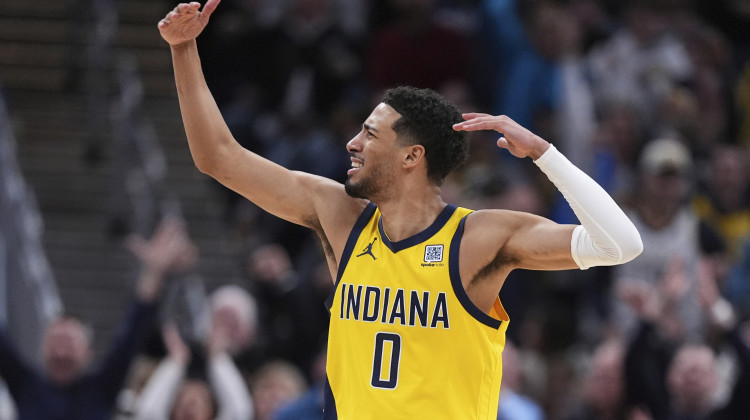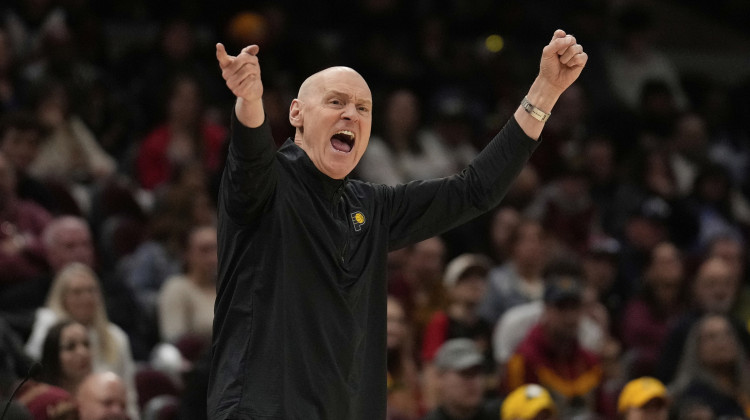Leah Johnson's new novel "Rise to the Sun" tackles themes of grief, joy and happy endings through the power of music. Her first book, "You Should See Me in a Crown," explores race, class, and sexuality and drew widespread attention as the first YA [young adult] pick for Reese Witherspoon's national book club.
Johnson spoke with WFYI's Robert Moscato-Goodpaster about the role music has played in her life, gun violence, and the continued importance of giving queer, young, Black women a happy ending.
LEAH JOHNSON: "Rise to the Sun" is a book about two girls named Toni and Olivia, who are coming off the heels of two very difficult years. Toni is grieving the loss of her father. Olivia has just had a breakup that's made her an outcast — both at home, with her family, and at school. And the two go to a Music Festival in search of one last epic weekend before they embark on the next big chapters in both their lives. When they get there, they find each other and realize — in order to accomplish all the things over the course of the weekend they want to accomplish — not only do they need to rely on each other, but they need the music more than they ever thought possible.
ROBERT MOSCATO-GOODPASTER: And so the novel is set at the Farmland Music Festival, and it is a place that the character Olivia describes at one point as being a place where she feels free and safe — completely at home. Since she feels that way about this space, what drew you to set this novel at a music festival, especially for these characters.
JOHNSON: Live music has been a huge part of my coming of age, and sort of my understanding of self. And so it felt really organic to me to set a story like this about two girls who are both sort of stumbling through this chapter in their lives trying to figure out what they want, and what they need and who they want to be. And for me live music spaces always sort of — if not provided an answer to those questions — at least provided me a home and a space to figure those answers out. So I go to Bonnaroo every year with my best friend. And the first time I went I had never felt so free. Like I'd never felt so able to let go of all these ideas about shame and embarrassment. And just dance like nobody cared. And talk to strangers in a way that made them feel like family and sing at the top of my lungs regardless of what it sounded like, just because it felt good. And so I wanted to give that same type of freedom to these characters and put them in an environment where they had the room to be a little messy, make some mistakes and find the music that they've lost.
MOSCATO-GOODPASTER: Speaking of music and the book, is there a passage you would like to share? And is there anything we should know before? Is that the scene?
JOHNSON: Yeah, I'm gonna read a bit from the second chapter, which is from Toni's point of view, Toni lost her father eight months before the book takes place. And she is trying to figure out what that means for her life and where she's supposed to go next.
"The thing is, no one could have prepared for the way we lost my dad. But that didn't change the knowing emptiness that had taken up residence inside of me over the past eight months. I don't know if I believe in a higher power or life after death or any of that stuff the minister said at my dad's funeral. But countless summer spent at the greatest Music Festival in the world, on a former farm and Rattle Tail, Georgia, along with sixty-thousand other music fans, watching sets from top his sunburned shoulders taught me one inalienable truth, that somewhere in the light-years of space between the spiritual and the scientific, between the known and then ineffable, there's live music. There's Jimi Hendrix playing a two-hour set at Woodstock that revolutionizes rock and roll forever. There's Beyoncé becoming the first Black woman to ever headline Coachella and delivering a performance that redefines a culture. There's Bob Dylan going electric at Newport Folk in '65 and Queen reuniting at Live Aid twenty years later. Live music is a True Thing: It holds the keys to the universe, and all you have to do is pay attention.
MOSCATO-GOODPASTER: I love that. A lot of Toni's storyline too, she really struggled with like she had so much love for her dad. But then also there was a point where she had a conversation with her mom, where she kind of recognized what music had actually taken from her as well. Because it's given so much to her, but he [her dad] was like out on the road and he wasn't able to, you know, say say good night before bed. And so it was also interesting that you touched on that relationship with music to her as well. Without giving too much away to also bring up this conversation of guns and how they instill constant fear in us, especially in large crowds, such as a music festival. So why was it important for you to incorporate this topic in this book with this setting?
JOHNSON: I think for me, there is no conversation about public spaces full stop without having a conversation about this uniquely American type of violence. There is a lust for blood in this country the likes of which no other developed nation in the world sees and we have the means to stop it. We have the means to step in and ensure that people can go about their days and about their lives and go to the grocery store or to The club or to the movie theater or to a concert, and they can be safe. They can feel at home in their bodies without having to fear for their lives. And we don't. And so, in my opinion, if there's a story about how these spaces can make us feel free, then I also should talk about the way that these spaces can make us feel afraid or can make us feel bound. And so the story was always a love story. But it was also always intended to be a story that talked about the things that hurt us. He, I should say, this is like a, it is a joyous book. But I do think that like, for me, a lot of like, the heaviness of the book is tied up in grief. And about this idea that like, even if we're here and happy that hereness and happiness can be snatched away from us. So it's a question of, do I make the decision to love somebody? Anyway, knowing that everything we have is fragile, everything that we have, is able to be taken away from us with the pull a trigger. And so, you know, it's it's one of those things that I'm still very much reckoning with, I'm still thinking my way through. But when I sat down to write rise to the sun, it felt unavoidable.
MOSCATO-GOODPASTER: You've mentioned before about the importance of giving your characters a happy ending. However, it doesn't come easily for Toni and Olivia, especially Olivia, because although she is a hopeless romantic, there is also this self sabotaging pattern that she falls into when there's a possibility that things won't work out in her favor. And so I wanted to ask, was there a specific narrative in society that you noticed and wanted to call attention to that causes these Black young queer women to believe that they don't deserve a happy ending or don't think it's possible, and therefore they are more prone to those kind of patterns.
JOHNSON: You know, with Olivia in particular, it was really important to me to put a character on the page that was very messy. Olivia is at her core, a really good person, but she struggles to act in a way that one doesn't sabotage herself, but to doesn't sabotage her relationships with the people around her, including her best friend. And part of the reason why it was so important for me to put a messy, you know, queer Black girl on the page is because I wanted to complicate this idea that there are only two narratives for Black characters, or queer characters, which is either like, there's a trauma narratives like you can be clear, but you're going to suffer, or you can be happy. But in order to attain that happiness, you have to be perfect. You have to be the top of your class and you have to be incredibly thoughtful and you have to be a philanthropist, you have to be all these things. Olivia is not any of that. Livia is a pretty mediocre student. By all accounts, she is pretty careless with her heart, but also with other people's hearts. And she's doing the best she can. But sometimes her best is not very good. But the thing that I wanted to illustrate was that those things don't preclude her from being worthy of love or care or affection. Maybe it's harder to see the humanity in her because she's not perfect. But that is where we need to sit. Those are the ideas that we need to append and we need to reconsider. Is that a black girl has to be everything for all people all the time. No. Black girls can be a mess. Black girls can make mistakes, and black girls should still in the end, get the love and care they deserve.
MOSCATO-GOODPASTER: Leah, it was a pleasure. Thank you so much.
JOHNSON: Thank you so much.

 DONATE
DONATE







 Support WFYI. We can't do it without you.
Support WFYI. We can't do it without you.